Shipowners need to prepare in detail for the requirements and compliance of the next phase of environmental regulations, writes Stamatis Fradelos, VP Regulatory Affairs, ABS.
FuelEU Maritime Regulation is a technical measure which is designed to decarbonize maritime transport applying three key objectives. The subject of growing industry interest, ABS has collected the most frequently asked questions received from clients own FuelEU Maritime and provided answers.
These are to reduce the GHG intensity of the energy used on board on a Well-to-Wake (WtW) basis, to promote the use of onshore power supply in main European ports; and to incentivize the uptake of Renewable Fuels of Non-Biological Origin (RFONBs), and Wind-Assisted Propulsion (WAP).
Starting from 2025, ships operating in the EU must fulfil their energy needs with fuels of GHG intensity on a WtW basis (measured in gCO₂ₑ/MJ) below a sliding scale threshold value subject to a five-year percentage reduction with respect to a reference value, which is based on the average energy used onboard in 2020, calculated equal to 91.16 gCO₂ₑ/MJ.
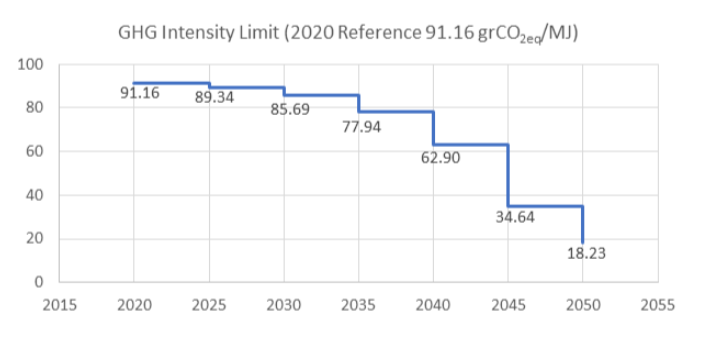
What are the scope and obligations of FuelEU Maritime?
The regulation applies to:
- the entirety of the energy used on voyages between EU ports and while the ship is at berth in an EU port and
- half of the energy used on voyages between an EU port and a port of a third country.
The Regulation covers GHG emissions from WtW meaning the release of carbon dioxide (CO₂), methane (CH4) and nitrous oxide (N2O) into the atmosphere. CH4 and N2O are converted into CO₂ equivalents, multiplied with Global Warming Potential of 100 years (GWP100) which is equal to 25 for CH4 and 298 for N2O, as defined in Directive (EU) 2018/2001 (paragraph 4 of Part C of Annex V).
However, the regulation is expected to be revised, with the aim to align with the global warming potential values for application under MRV and ETS referring to directive 2020/1044 and therefore GWP will become equal to 28 and 265 respectively.
How are the WtW emissions calculated?
The WtW emissions are calculated as the sum of Well to Tank (WtT) and Tank to Wake (TtW) emissions.
Annex II of the Regulation contains default WtT emission factors for fossil fuels, biofuels and RFNBOs. Sustainable biofuels and RFNBOs can either use the default values as provided in Annex II and RED II Directive or actual values certified under a scheme that is recognized by the EU Commission. However, for fossil fuels, only the default values can be used.
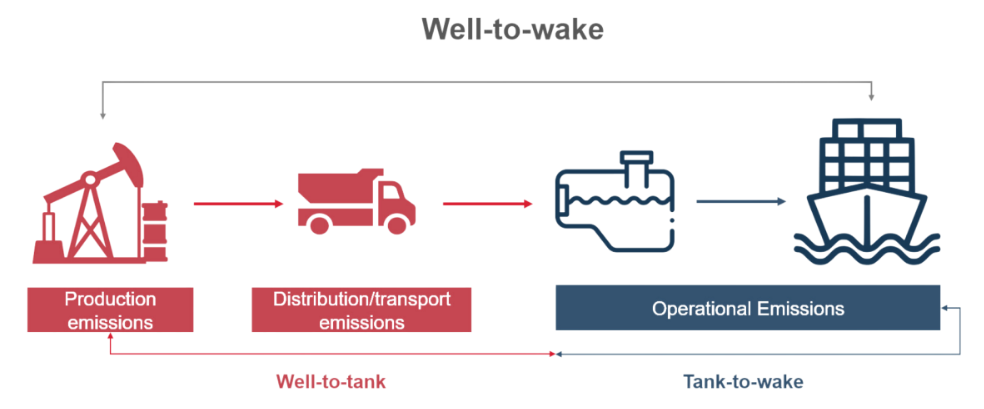
Annex II also contains the default TtW emission factors for fossil fuels, biofuels and RFNBOs. Companies shall be entitled to diverge from the default TtW emission factors – apart from the TtW CO₂ emission factors for fossil fuels – provided that actual values are certified by means of laboratory testing or direct emissions measurements. The following graph presents the WtT and TtW GHG intensity of various fuels and fuel mixes compared to the applicable limits.
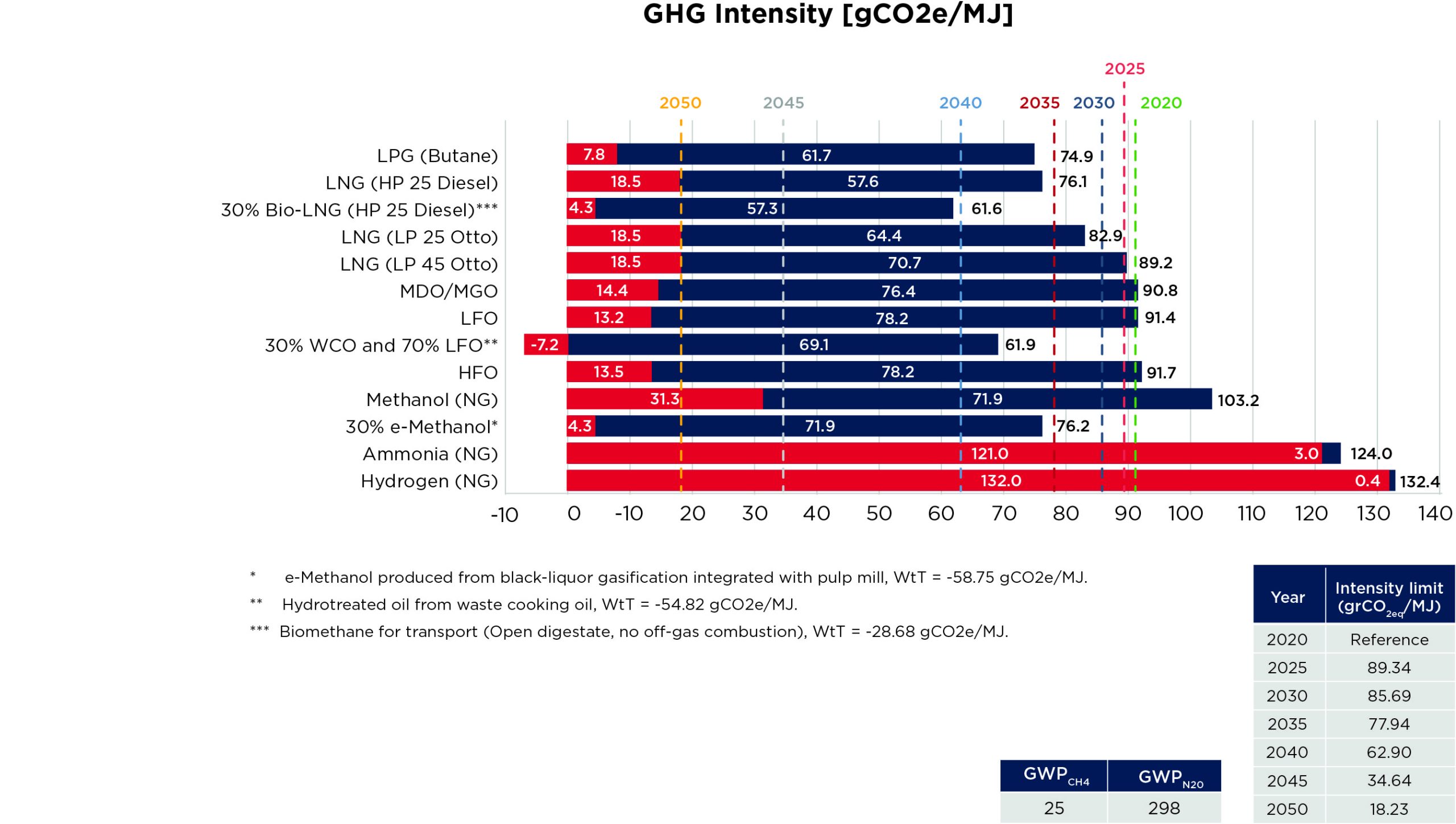
Are there any requirements for energy used at berth?
From 1 January 2030, containerships and passenger ships above 5,000 gross tonnes (gt), moored at the quayside in a port of call at a TEN-T maritime port shall cover its electrical power demand at berth using onshore power supply (OPS). From 1 January 2035, the obligation to use OPS at berth is extended to non-TEN-T ports, where the quay is equipped with OPS.
What is the timeline for compliance?
Companies should be responsible for monitoring and reporting the amount and type of energy used on board by ships and document the method used in a monitoring plan. The plan, as well as the annual emission reports shall be submitted to and assessed by the verifier in accordance with the timeline indicated below:
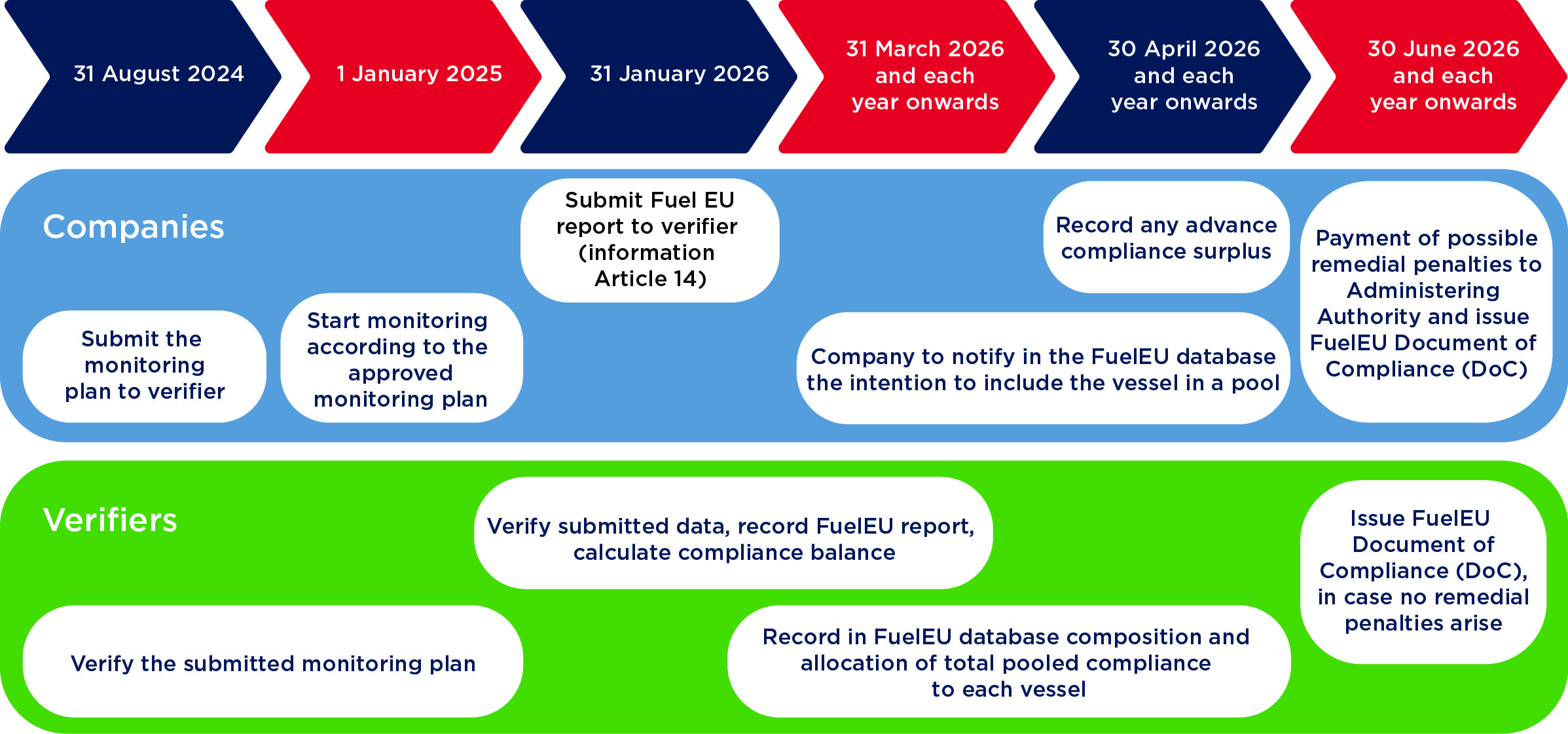
What are the penalties?
Ships with a higher GHG intensity than the threshold must pay a remedial penalty proportional to their compliance deficit. The compliance deficit is the difference between the reference GHG intensity and the actual one, multiplied with the energy consumption. The graph below shows the daily compliance cost for a ship using LSFO based on its daily fuel oil consumption:
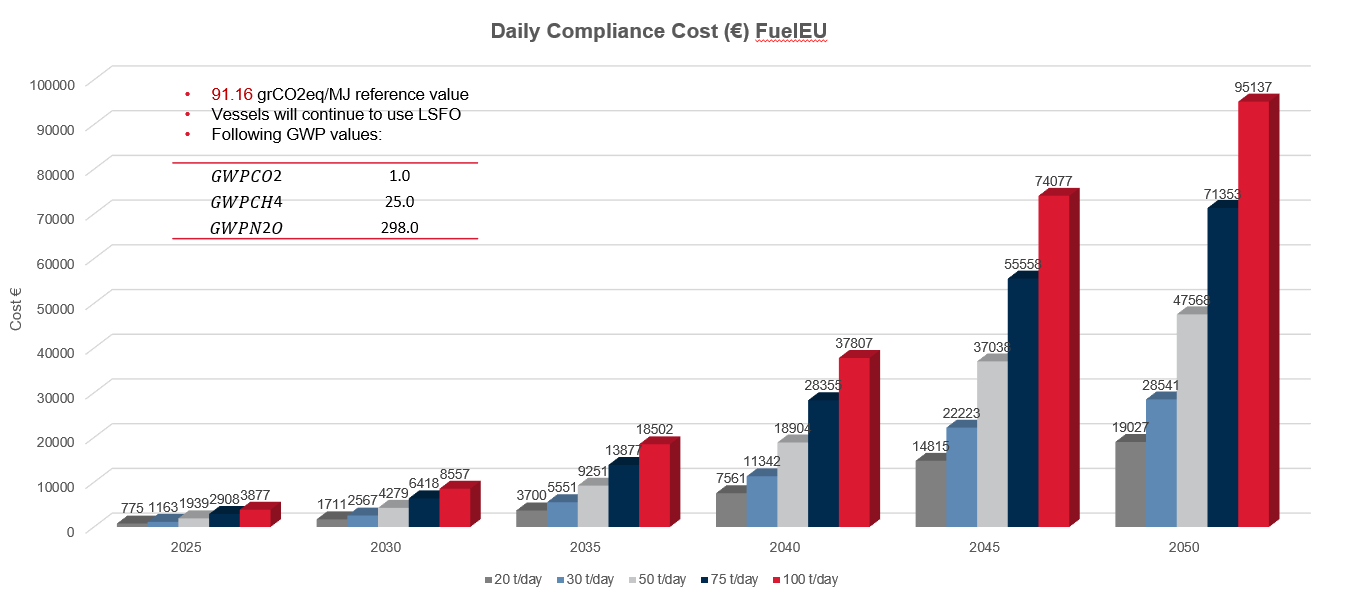
If a ship has a compliance deficit for two consecutive reporting periods or more, the remedial penalty will be increased by 10% every consecutive reporting period until the ship achieves a compliance surplus for the increase factor to reset.
Will renewable fuels be incentivized?
The production costs of RFNBO are currently much higher than the market price of conventional fuels. Therefore, two measures are provided to ensure the support for the uptake of sustainable RFNBOs.
- A ‘multiplier’ until the end of 2033, allowing the energy from RFNBO to count twice
- A sub-target of 2% RFNBO minimum use of the total yearly energy use by ship which shall apply as of 2034 if, the share of reported RFNBOs used by ships is less than 1% by 2031.
This combination of measures to support RFNBOs is intended to give ship operators and fuel suppliers a market signal for investment in this type of renewable, scalable and sustainable fuel. However as per Article 10.1(b), RFNBOs (and low/recycled carbon fuels) should meet the GHG emissions savings threshold set out in RED II Directive (at least 70% savings which correspond to max. 28.2 g CO₂e/MJ WtW GHG intensity based on 94 g CO₂e/MJ fossil fuel comparator), otherwise shall be considered as a fossil fuel.
Is there a benefit for using biofuels and biogas?
Biofuels and biogas can be used as a compliance option for the purposes of reducing the WTW average GHG intensity of the energy used on board for meeting the GHG intensity limits on a ship or pool level. However as per Article 10.1(a) biofuels and biogas should comply with the sustainability and GHG emissions saving criteria set out in RED II Directive and should not be produced from food and feed crops, otherwise shall be considered as a fossil fuel.
What about ‘Blue fuels’?
FuelEU Maritime will also count the possible contribution from low-carbon synthetic fuels derived from low-carbon hydrogen, including or not CCS. Eligibility of “blue fuels” (synthetic fuels derived from fossil-based hydrogen + CCS), is considered in Article 10(2) where it is stated that other than biofuels, biogas, RFNBOs or Renewable/Low Carbon Fuels, also fuels certified in accordance with European Union legal acts concerning internal markets in renewable and natural gases and in hydrogen, establishing a GHG emissions savings threshold and an associated methodology to calculate GHG emissions from production of such fuels, will be eligible to contribute to the reduction of the GHG intensity of the energy used onboard. In addition to blue fuels, low-carbon synthetic fuels derived from nuclear electricity will be covered.
What about wind power?
FuelEU aims to foster innovation and support research for emerging and future innovation, such as wind-assisted propulsion (WAP) including inter alia rotor sails, kites, hard or rigid sails, soft sails, suction wings or turbines. The impact of WAP on the GHG intensity of the energy used on board is reflected via the factor ‘fwind’ in the GHG intensity calculation formula:

where fwind is the reward factor for WAP which is determined based on the ratio of the available effective power (PWind) and the propulsion power of the ship (PProp).
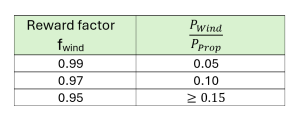
The graph below shows the reduced daily compliance cost for a ship using LSFO fitted with a WAP with a reward factor fwind = 97%:
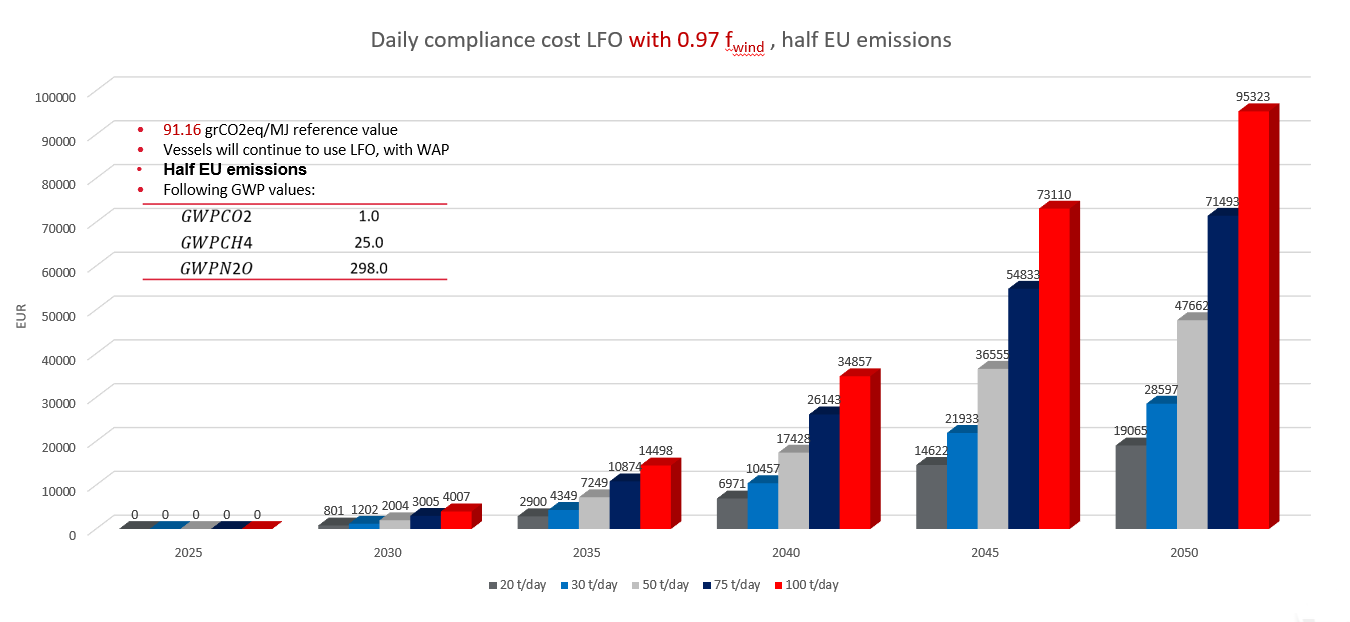
Does the Regulation provide flexibility for compliance?
In the case that a ship has a compliance surplus, the company may ‘bank’ and use it for the same ship in the following reporting period. In a case where the vessel has a compliance deficit, the company may borrow an advance compliance surplus of the corresponding amount from the next reporting period. However, in the next reporting period, the borrowed compliance surplus must be multiplied by 1.1 and be subtracted from the same ship’s balance.
Furthermore, the compliance balance for GHG intensity and sub-target of RFNBOs can be pooled. Pools can consist of vessels of the same or different companies. Two different pools can be used for compliance with the GHG intensity target and RFNBOs sub-target. A pool is only possible if total pooled compliance is positive, ships that had a compliance deficit do not have a higher compliance deficit after the allocation of the pool or if ships that have a compliance surplus do not have a compliance deficit after the allocation of the pool.
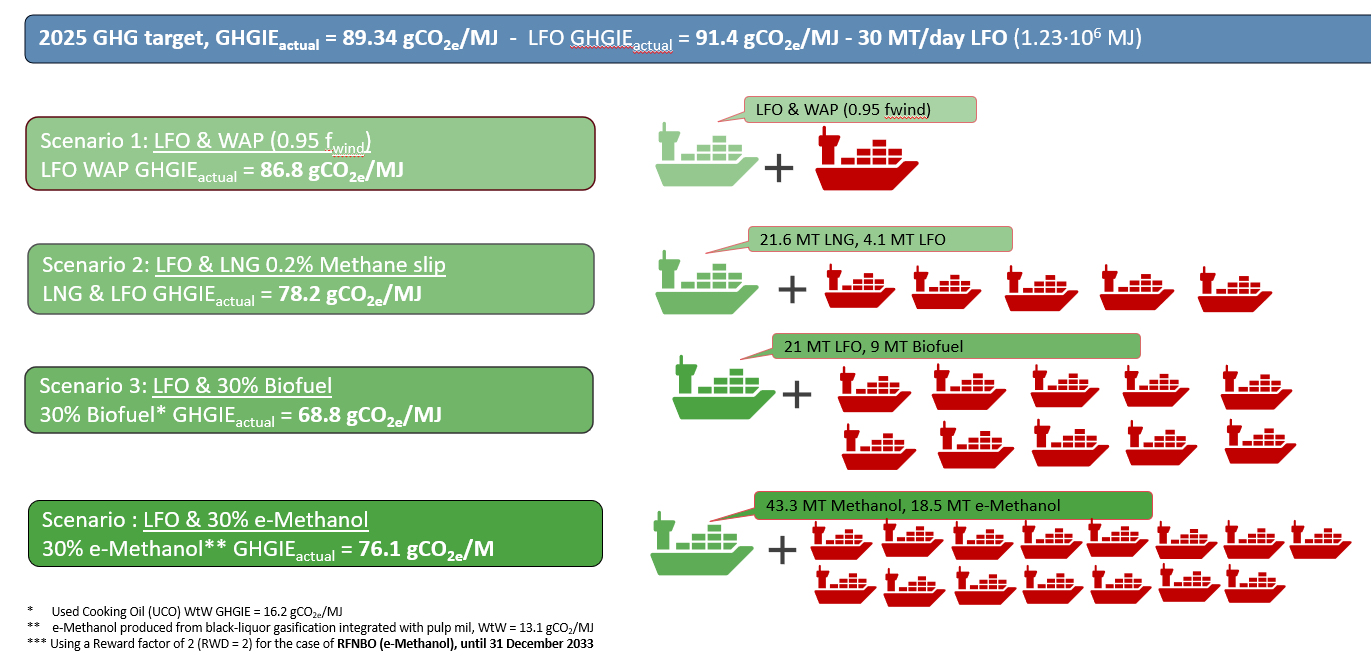
Is onboard carbon capture and storage mentioned?
Onboard Carbon Capture (OCC) is not yet specified in the Regulation, but article 30.2.(i) provides that the Commission shall consider the possibility to include OCC, in the calculation of the GHG intensity of the energy used on board and of the compliance balance, subject to the availability of a verifiable method for monitoring and accounting of the captured carbon.
The views presented are only those of the author and do not necessarily reflect those of SAFETY4SEA and are for information sharing and discussion purposes only.































































